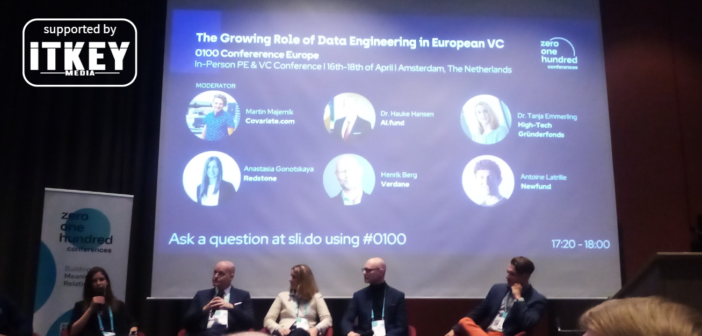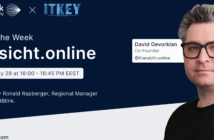- Zero One Hundred Conferences’ 0100 Conference Europe 2024 offered a couple of days tightly packed with topical insightful discussions
- Arguably the most exciting trend is the increasing role of data in PE/VC processes
- It was concluded that this trend will lead to further data automation in PE and VC – both with in-house tools and third-party ones
On April 16-18th, Leonardo Royal Hotel Amsterdam’s doors hosted yet another edition of Zero One Hundred Conferences’ 0100 Conference Europe. As usual, the event with over 120 reputable speakers and panelists was primarily (but not exclusively) aimed at LPs. As such, its program was geared accordingly.
ITKeyMedia spotlights the panel discussion dedicated to The Growing Role of Data Engineering in European Venture Capital. The speakers included:
- Henrik Berg, CTO at Verdane
- Dr Tanja Emmerling, Partner at High-Tech Gründerfonds
- Anastasia Gonotskaya, CTO at Redstone
- Dr Hauke Hansen, Founding Partner at AI.Fund
- Antoine Latrille, CTO at Newfund
- Martin Majernik, Co-Founder at Covariate.com
Mr Majernik took on the moderating role and, after quick introductions, moved on to the first question about the possible use cases of data in the VC lifecycle – other than the apparent portfolio performance monitoring and due diligence.
Use Cases Throughout the Life Cycle

Martin Majernik, Co-Founder at Covariate.com
Dr Emmerling pointed out that her firm started looking into such possible use cases early on. According to her, in order to track the financial data in the market properly, one needs to keep other parameters in scope. This includes all the data that you get from early founders, track records, etc., which points to data-driven sourcing.
Ms Gonotskaya added that the opportunities for utilizing data are scattered all over all the stages of the VC lifecycle. Redstone has an internal system of tools that respond to specific needs along the chain, without forming a single platform. Importantly, the chain doesn’t begin with deal sourcing but rather with the very formation of the fund, and it goes on all the way to the stage where the fund has to support the portfolio startup.
Mr Berg mentioned his PE background where it’s possible to utilize AI for bias detection. Overall, according to his numbers, being data-driven can raise the efficiency as much as up to 12 times for PEs and 5 times for VCs.

Antoine Latrille, CTO at Newfund
Mr Latrille’s firm mostly uses the data for leveraging the network. This is particularly useful for companies over 10 years old with a significant track record and a lot of information to manage and build upon. Additionally, when traditional institutions (e.g. banks) are involved, they may inquire for additional information that you won’t be able to provide to them unless your data is well-managed.
From Dr Hansen’s perspective, PEs should use data to qualitatively challenge VCs’ calculations (e.g. ARR). This will naturally depend on how data-driven both parties are and boil down to supporting VCs in making the right decisions and helping them grow.
Outsource or In-House?
Based on these answers, there is still room for PEs and VCs to grow in terms of being data-driven, and the trend is clear. In view of this, Mr Majernik’s next question was whether it’s better for a firm to develop the necessary tools in-house or use third-party ones.

Anastasia Gonotskaya, CTO at Redstone
Naturally, it depends on what one plans to do with a particular portion or layer of data. Some solutions can be found out there whereas others will need to be developed in-house. Ms Gonotskaya agrees that the solution is a hybrid approach where a firm keeps a team of several people who are building certain tools and buys other tools that are available. It is apparent that commissioning an in-house team to build tools that are already available is a poor allocation of resources.
Instead, it’s much more efficient to allocate this resource to manual data processing, i.e. have 1-2 data experts on the team, which is particularly important today, at the current pace of technology and the expansion of the amount of data. With all this abundance, the need for people who understand how to structure this grows particularly acute.
As Mr Berg pointed out, ‘size matters’ in this game. Among other ways to understand it, Europe remains smaller and less advanced in this regard than the US. Being bigger allows one to systematize and automate data processes better. Moving further, a firm wants to keep data in-house but doesn’t want to spend the money on a team of expensive data people, the solution is for the partners to study the subject themselves.

Dr Tanja Emmerling, Partner at High-Tech Gründerfonds
According to Dr Emmerling, such an approach provides for the strategic view of the data, which is what funds sell to their LPs in the end. As such, she spoke in favor of the in-house approach, which Dr Hansen backed up. His argument is that the processes need to be integrated and the in-house people need to know where to find the needed bits or procedures at all times.
Mr Latrille specified the factor of data expense, i.e. it makes more sense to build certain tools in-house on a bigger market than on a smaller one. The approach to this should not be an end-goal in itself but rather a means for helping funds to sell data to LPs and educating them if necessary in a clear and comprehensive manner. As Dr Emmerling pointed out – LPs often need to be helped to see how data can give them better insights than their own experience.
Horror Stories

Henrik Berg, CTO at Verdane
From there, Mr Majerink suggested concluding with a lighter topic – ‘horror stories’ about possible awkward experiences that the panelists may have had on the topic. Mr Berg started off with a story where he got appointed to the board of a recruiting firm which has spent years and millions on acquiring top apps. These apps kept returning different information based on the same data pool. These apps were supposed, for example, to capture a candidate’s soft skills based on their CV data. As for Mr Berg, he is strongly convinced that all such processes need to be visualized, tracked, and managed instead of blindly relying on apps’ output.

Kostiantyn is a freelance writer from Crimea but based in Lviv. He loves writing about IT and high tech because those topics are always upbeat and he’s an inherent optimist!





